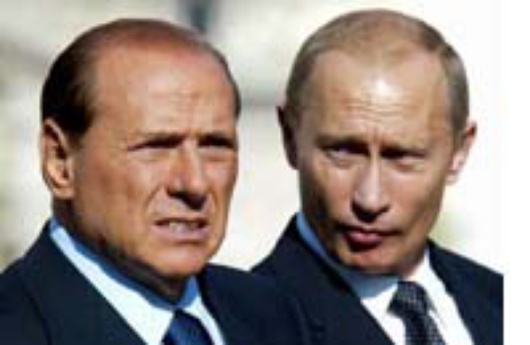The EU and Russia at odds again
Published on
The postponed EU-Russia Summit was finally held last week but relations, which were already strained, have not been helped by the presidential struggle in Ukraine
 President Putin had threatened to boycott the 14th EU-Russia summit after it became clear that there was little chance of the Partnership and Cooperation Agreement (PCA) - a wide-ranging deal which outlines four 'common spaces' between the EU and Russia (economy, domestic-security, external-security and human rights) – being adopted. The meeting was then postponed, ostensibly because of wrangling over Barroso’s new Commission. When it was finally held, agreement was only reached on the first two ‘spaces’.
President Putin had threatened to boycott the 14th EU-Russia summit after it became clear that there was little chance of the Partnership and Cooperation Agreement (PCA) - a wide-ranging deal which outlines four 'common spaces' between the EU and Russia (economy, domestic-security, external-security and human rights) – being adopted. The meeting was then postponed, ostensibly because of wrangling over Barroso’s new Commission. When it was finally held, agreement was only reached on the first two ‘spaces’.
Problems over the summit are symptomatic of the deteriorating nature of EU-Russia relations, which have been dealt another blow by the electoral crisis in Ukraine, their common neighbour. While Putin hurried to congratulate Viktor Yanukovich, the pro-Moscow candidate, the EU is convinced the election results were rigged by the Ukrainian authorities to prevent the victory of Viktor Yushchenko, the pro-European candidate. As the haggle over Ukraine shows, human rights and foreign security are still sticking points, while Russia’s fear of losing influence in its backyard has clouded the main goal of the summit: closer ties between Russia and the EU.
"Russophobia" or constructive criticism?
True, their economic ties are strong: the EU receives more than 50% of Russia’s exports and is highly dependent on Russian gas and oil. But on a political level, they are less chummy. The EU worries that some Russian practices, such as the antidemocratic political reforms which Putin announced in the wake of the Beslan siege, “run counter to universal and European values”, as a policy paper of the Commission put it earlier this year. With the EU’s enlargement, the Moscow-critical camp within the Union has increased, with Poland and the Baltic states being particularly reticent towards Russia. In turn, Russia is disgruntled about the position of its minorities in these states and alleged “Russophobia” in Brussels. Putin is also displeased by remarks from European leaders on Russia’s internal affairs, as was recently shown when the Dutch foreign minister, Ben Bot, accused the authorities of making a mess in Beslan.
Ukraine splits the EU
Attitudes towards Ukraine reflect an internal split within the Union which has become more apparent with its enlargement. The Poles, for example, have been lobbying hard for a special relationship with Ukraine (and later Belarus) that might eventually lead to their EU membership. They argue that the longer these countries are left out, the greater the chance they will be lost to the authoritarian Russian grip for good. However, the EU countries that are geographically removed from Ukraine seem to be more concerned with their bilateral ties with Russia. Moreover, they see the joining of another big needy country to the EU as simply impossible. Thus, despite Polish efforts, there is no consensus on offering Ukraine a date to start entry negotiations. This division within the EU, reinforced by economic malaise and a pitiful common foreign policy, diplomatically strengthens Putin.
As a result, Russian leaders are in a comfortable position to drive hard bargains. They want to be taken seriously, and are less concerned with friendship than with commercial and diplomatic gains. Hence Russia’s ratification of the Kyoto treaty on climate change came only after EU support for Russian membership of the World Trade Organization and other economic advantages were ensured. This same stubbornness over the “common spaces” hindered last week's summit, which failed to reach a satisfactory conclusion. If Russia’s self-esteem is wounded by an increasingly western hold on Ukraine, it is likely to protect its sphere of influence even more strongly in the future.



